Helping Your Teen With Adolescence: The Ultimate Parent's Guide
Your kid may be transitioning into adolescence, they may be growing fast, but they need you now more than ever. In this article, I will share some tips on how to help your teen with adolescence. I have been a parent for almost 20 years, and I have seven kids. I feel confident that I can give you some good advice on what to do and what not to do.
The adolescent years are challenging for both parents and kids alike. Reaching adolescence is often the first major step into adulthood, and it’s a scary time for both parties. There will be changes in your teen’s mind, body, social life, and almost every other aspect of their lives.
What is the Definition of Adolescence?
Adolescence can be defined as how an individual transitions from childhood to adulthood. It is often regarded as a period of self-discovery, encompassing physical, psychological, and social changes. It is a time of transition from childhood to adulthood, a time for teens to develop new relationships outside of their families and exert their independence.
The word “adolescent” is based on the Latin “adolescere”, meaning “to grow up”. It was first used in the mid-16th century to refer to a young person who had attained maturity or puberty, especially from a Roman Catholic perspective. The term “adolescent” continues to be used today to refer to a child between 10 and 17 years of age.
Stages of Adolescence: The Physical and Emotional Changes Experienced During Puberty
What Changes Boys and Girls Experience When They are 10 to 13 Years Old?
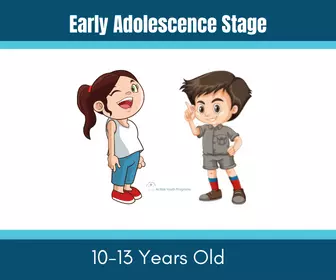
This stage typically begins with sudden growth spurts, increase in appetite, new body hair development in the underarms, pubic region and chest. Development of sexual organs, spontaneous erections, wet dreams, pimples and voice changes for boys.
For girls, suddenly their breasts grow, their hips get bigger and they gain weight and start their periods.
The psychological changes affect both boys and girls. They begin to challenge parents’ behaviors and authorities, ask more philosophical questions and develop abstract thinking. They start to look for role models outside the family, they reflect on their identity, start thinking about gender and become self-conscious.
The emotional changes are more intense, as they become moody, experience new emotions like fear, anger and become socially awkward and self-aware while experiencing new sexual feelings.
The behavioral changes are more obvious as they begin to withdraw and assert independence, challenge authority figures at home and at school, keep secrets and seek more privacy and often begin to question and some start to reject their parents.
What Changes Boys and Girls Experience When They are 14-16 Years Old?
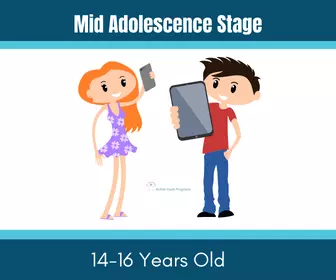
At this stage teens experience faster growth rates, have a need for more sleep and adolescent psychological changes include growing imagination, greater reasoning, more introspection and abstract thinking.
This is also a time in adolescent development when teens begin to have opinions about politics, religion, environmental issues and they become more idealistic and passionate about topics that never mattered before.
They also become much more self-critical while simultaneously thinking the world revolves around them and one minute they are mature and the next they are regressing to childhood moments and attitudes.
This is a very difficult stage for parents and usually the time where conflict begins as adolescents experience emotional changes like sadness, worry, a more intense sense of fairness and moral consciousness, and assert more independence.
Usually at this stage children begin to focus on the opposite sex, develop new romantic feelings and become more preoccupied with their body image, physical and sexual development.
Behaviorally they have a greater need for freedom, start to take risks and push boundaries, experiment with substances, assert their independence by changing their appearance, dying their hair, getting piercings and or tattoos and developing their own sense of fashion and style.
Teens become more expressive, opinionated, often testing their values, trying to develop new romantic relationships, exploring new friendships, choosing new peers and wanting to spend more time with friends than with family.
As there sexual feelings are heightened, they may become ambiguous, confused or try new sexual partners. This is a time to explore limits, express their own values, become critical of the adults in their lives as they try to test the limits and understand consequences.
What Changes Boys and Girls Experience When They are 17 -19 Years Old?
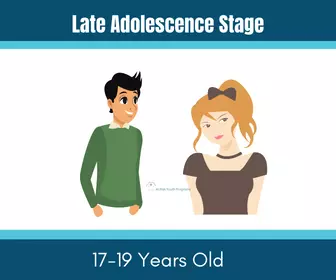
Depending on what’s happened at home during the last two stages, this last stage of adolescence can be more complicated and challenging or it can be less confrontational as the transition from adolescence to adulthood comes to an end.
The physical and psychological changes are obvious as they appear physically grown and mature. The emotional and behavioral changes relate more to their future life including education and career choices, romantic relationships and becoming independent from their parents.
If appropriate limits were set during early adolescence and the parent child relationship survived the last two stages this can be a positive time of transition with mutual love and respect.
If there was a lot of conflict, rebellion and antagonism, your grown adolescent can be experiencing worrisome behaviors and may need professional help to thrive in adulthood.
What to Expect When Your Child Becomes an Adolescent?
The biological onset of adolescence is the completion of growth, which occurs after the start of puberty. While we’ve discussed the different stages, the fact is that during adolescence, young people experience an explosion of hormones that bring about many changes in their bodies and affect their emotions and ability to cope with what they are experiencing.
This is a time when children need their parents much more than they realize and where parents can express their love and support as their child experiences these traumatic changes which leave them vulnerable and insecure.
What are Some of the Effects of Puberty?
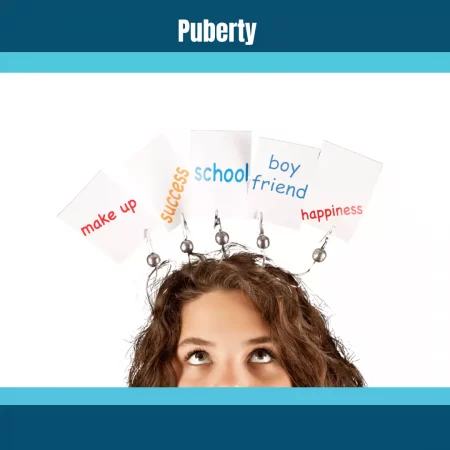
Puberty can be an awkward, uncomfortable period of life, and children may feel ashamed or embarrassed about what their bodies are doing. Pimples, dry skin, oily hair, and other physical changes can make kids feel self-conscious.
At this time, there can be emotional problems related to a sense of inferiority, fear of sex, fear of pregnancy, etc.. At the same time, social and cognitive development occurs.
For boys, puberty starts at age 10-12, while girls start earlier, usually around 8-10. To help your child over their middle school years and beyond, you need to help them navigate these physical and emotional changes gracefully.
Girls, have to deal with hormonal changes, PMS, and menstruation at the same time as they are “falling in love” and having all of these new sexual feelings.
Is it me, or do you also think that life can be a little cruel at this point in puberty and adolescence? While your child is experiencing changes like skin development, their voice deepens and their sexual organs and reproductive systems mature.
Parents are not the best judges of what’s ‘normal’ or not at this time as we experience heightened conflict and distress as conflict increases.
Why? I read a study that estimated that approximately 20% of parents and teens engage in unhealthy conflict. The conflict results from our teenager’s choices in clothing, music, and what they do with their free time. If you think about it, these arguments are about things that do not matter.
These are not topics that are life altering, yet they create long term harm and stress the parent-child relationship causing bad feelings, anger, and growing resentment.
If you are reading this guide, you are likely seeking to understand what is happening with your teenager. You may or may not be aware that how you respond to your child during this difficult time may have a bigger effect on your relationship surviving this transition.
I encourage you to keep an open mind and recognize that not only is your child changing, but you also need to recognize that your entire family dynamics is changing and that you also must be willing to be more optimistic, explore new parenting styles and adapt new parenting skills.
What is Happening in the Adolescent Brain?
While the prefrontal cortex is developing teenagers have the capability to adapt to many social circumstances and situations but they are very vulnerable to influences.
This duality is particularly harmful to children with conduct disorders who tend to take inappropriate risks and behave recklessly.
A single poor choice or decision during this vulnerable time can inadvertently harm an adolescent’s future, stunt their brain development and emotional growth.
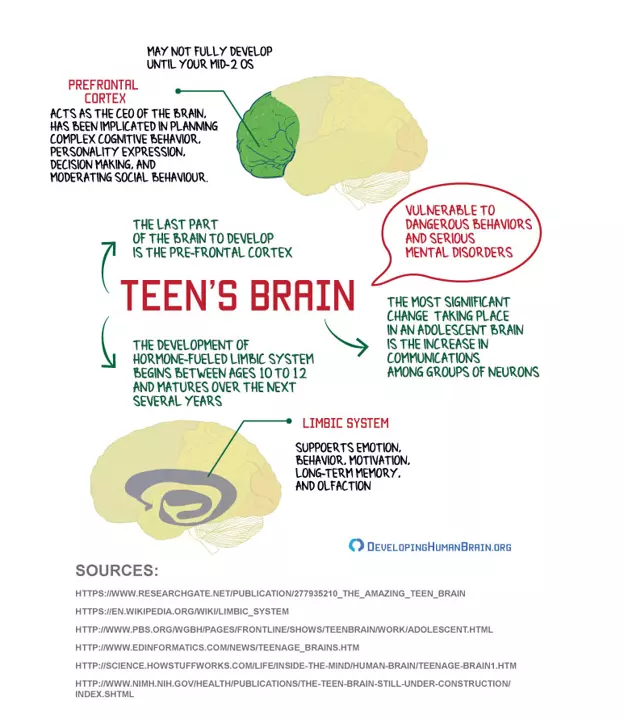
Parenting Teenagers: How to Survive the Adolescent Years?
I’ve heard it said that “it is a miracle we survive our teenage years” but I think it is a miracle parents survive parenting teenagers and not lose their minds.
Think of it, we spend the first 10 years of a child’s life conditioning them to learn from us, listen to us and make good choices. Then we spend the next 10 years being told by the same children that they don’t have to listen to us, we don’t know what we are saying, and are judged and criticized by the same kids for the choices we’ve made!
Sometimes it may feel like you won’t but you need to know that you will get through this!
No matter how good you are, at some point your kids are gonna have to create their own independence and think that Mom and Dad aren’t cool, just to establish themselves. That’s what adolescence is about. They’re gonna go through that no matter what.
– Eddie Vedder
But I digress, getting back to the point:
Those years where we are going from a kid to a grown up are busy and tough. In addition to the physical, emotional, and psychological changes teens are having to make real decisions like driving a car, being cool, dating, choosing the right clothes and trying all sorts of new things.
They’re also incredibly stressed, anxious, and overwhelmed as they try to find their place in the world while coming to grips with who they are and what their future will look like.
Teaching Teens Responsibilities
Responsibility can be a very confusing issue for teenagers. When you’re still trying to figure out the world around you, the last thing you want is to be responsible or accountable. Yet, as kids grow, they must embrace new responsibilities.
How a child deals with responsibility depends somewhat on your parenting style. Some parents will give their children freedom, while others will lay down strict rules and boundaries. Both approaches have inherent risks, it’s best to find a balance between freedom and responsibility.
To limit confusion and misunderstandings the best approach is to communicate clearly and specifically. Find a balance between too strict and too permissive. Knowing when to say “no” and giving teens positive attention and love will help throughout this transition.
The biggest difference between rearing a child and nurturing a teenager is giving up control when it comes to making decisions. Children appreciate structure and are unable to make decisions. When kids become adolescents they seek control and are not looking to us to manage their lives as much as they need us to guide and coach them.
Setting Rules and Boundaries for Your Teenage Child
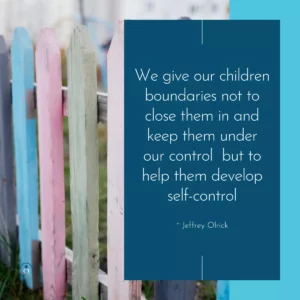 Having rules, setting boundaries, and giving teens responsibility are essential parts of growing up, encouraging them to make decisions and gain control over their daily lives.
Having rules, setting boundaries, and giving teens responsibility are essential parts of growing up, encouraging them to make decisions and gain control over their daily lives.
Parents who resist relinquishing control create power struggles that result in rebellion.
This new approach is conducive to a child creating a new identity and making independent decisions. It is natural for children to rebel against parental authority. Understanding that this is a normal stage of development, parents should be more proactive in involving their children in the rule-making process. A child is not likely to rebel against a rule that they helped create.
Shifting our roles from rule maker to offering guidance and support takes some adjustment. The same applies to how we communicate with our children. Communicating with respect and sharing the appropriate amount of information at the right time, we won’t trigger their sensitivities.
Young people don’t want to be treated like children and told what and how to do things. Instead consider how you would talk to another adult to someone you respect, and use that approach, you want to influence their thinking and encourage them to come to a conclusion or a decision instead of directing them.
This is a time when teenagers must develop their sense of self and make independent decisions and your change in approach is beneficial towards that process.
According to psychologist Erik Erikson, in the final stage of his childhood psychosocial development framework, a person must learn to cope with doubt and conflict by balancing autonomy and intimacy to develop intimate relationships without sacrificing independence.
Everyone has doubts but an adolescent’s life is ruled by it, all of the changes that are happening during the adolescent phase cause insecurities and doubts, internal conflicts and the need to be in control. When your child has some level of autonomy he feels less threatened. Therefore, there is less need for conflict, and a higher willingness to cooperate, especially if it’s in their own self-interest.
As a parent you should be encouraging your child to exert their independence. Recognize they feel intense, sometimes overwhelming emotions and have a need to be oppositional or argumentative.
Use these opportunities to show love and support. Make time to listen, show them respect by giving your child privacy and helping your teenager feel safe and secure.
What I am suggesting is not easy, but if you remove the need for conflict, you are going to have a more productive relationship. There will be triggers for you, but you can handle it.
Is Your Child At Risk?
Speak to our family advisors today to learn what residential treatment program or therapeutic boarding school are accepting new patients or students.
How to Improve Communication Between Parents and Teenagers
Be honest and don’t be embarrassed whenever sensitive topics come up. If your child asks a sensitive question, be prepared to answer. If you need time to think through or formulate your response, delay the conversation.
The best way to influence your child’s thinking is to provide them with the answers they need, so they don’t form an opinion solely based on the internet or their friend’s facts.
The best advice I can give you is to avoid acting emotionally and do your best to pick your battles.
Don’t be shocked when you hear your child swearing. Adolescents are often looking to see our reactions. Negative responses are the basis of conflicts, so do your best to avoid them.
So when your teenager wants purple hair, remember that it’s typical for adolescents to try new things and test boundaries. This is not about you or your beliefs, your reaction can impact whether your child tries the new hair color or moves on to the next thing.
Have high expectations of your teen, and let them know you have these expectations. Avoiding conflict does not mean you have to be a pushover or not enforce the rules.
Being clear on the family rules, what behaviors you will accept and how to communicate helps children in these stages of adolescence understand limits and create consistency. Show encouragement and adjust the rules as your children grow.
The rules for an 11-year-old should be different from those for a 16-year-old. But, once the rules are adjusted you should expect they are honored and followed. Don’t focus on obedience, instead focus on mutual respect.
Don’t take your eye off the ball. There are many warning signs that things are not right with your teen.
- Are they overweight?
- Are they not sleeping well?
- Has their behavior changed?
- Are they in love?
- Are they having problems at school?
- Are they suddenly depressed or acting differently?
You want to be on hand to guide your son or daughter without making them feel oppressed or judged.
Adolescents are very concerned about their privacy. This is very normal at this stage as it’s part of exerting their independence. Respecting your teen’s need for privacy does not mean you will not monitor what they do or their behavior.
Parents should know what teens do online, what they watch or stream, who they talk to, and text, whether they are being bullied or harassed. Keep in mind that while they don’t want you constantly interfering or telling them how to behave, they do want your love and support.
They still need you, perhaps more now than they did when they were small. Show them that you respect them and recognize their right to be more independent and that you trust them, this approach brings some equilibrium to the relationship.
If you think about it, you will have many ups and downs during this sensitive and precarious time. The parent child relationship evolves and tends to become more balanced as your child enters adulthood.
Your child loves you and wants you to be a part of their life, even when they don’t show it. Be there as their emotional support, their guide when they needed it, their parents. The relationship evolves into a more equal relationship over time and that is what you want.
5 Simple Tips to Help You Parent Your Adolescent
We’ve established that these years are challenging for both the teenager and the parent. The stress adolescents go through today is worrisome. Of course, every parent wants their child to grow into successful, mature, and responsible adults. Finding the balance between what we want for them and what they want for themselves is not easy for a parent.
Here are some tips and ideas designed to help parents maintain a caring, happy, healthy, and peaceful relationship with their adolescents:
1.
Support your adolescent's need to be independent
Allow them more freedom and help them learn to handle that freedom responsibly. Be involved in their life but don’t hover.
This is not the time to be a helicopter parent. Please make time to talk often and get to know their friends and their interests. Be close enough to help them when they need it but give them enough room and independence, so they don’t feel you are trying to control their behavior.
2.
Encourage their choice
Teaching your teenagers life skills will build their confidence and help them make better decisions. Learning to make good choices as we grow builds confidence. They should be making decisions about their daily lives, their friends, and their future.
You cannot be with your teenager all the time, but you can give them the life skills to act sensibly. For example, if your teen wants to spend time with friends, be sure they have a plan and a way to get home. Your teen should be responsible for making sure they get home safely.
3.
Be thoughtful
It’s crucial to be considerate and kind in every conversation with a teenager. You don’t have to agree with everything they say, in fact you won’t, but you need to let them speak openly without interruption.
You must learn to remain calm and listen more than you talk. Please get to know their interests and be open-minded. Ask open-ended questions and think of how they will hear what you say. Never have conversations when you are tired, frustrated, or angry.
4.
Pick your battles
Please stop trying to control what they wear. Teenagers will wear or not wear an item of clothing because it is cool, or they saw it on TikTok or Instagram. Fashion is a way to experiment and explore identity.
When you are critical about their choices, they see it as judgment and no one wants to be judged unfairly. If their choices are dangerous to their health, find a way to discuss them reasonably. Use facts and logic when appropriate, but listen to their perspective. Be careful. Save your emotional energy for what matters.
5.
Professional help may be necessary
No matter how good a relationship you have with your child, there are some situations where professional help is required. Adolescents need to have a safe place or person with whom they can share feelings and talk about their fears or concerns openly.
If you believe your child can benefit from having professional help, consider a therapist or a life coach. Ask other parents or your pediatrician for recommendations.
Adolescence is a time of significant change and challenges for both teens and parents. We have provided you with some strategies that can be used to help them through this difficult period in their life. If you would like more information on how to help your teenager, please explore our website. If there is anything else we can do for you, please let us know by reaching out or following us on social media.















